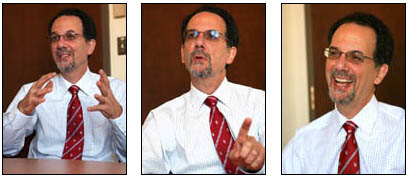Entre Nous with Mort Mendelson, Deputy Provost, Student Life and Learning
Entre Nous with Mort Mendelson, Deputy Provost, Student Life and Learning McGill University
User Tools (skip):
ENTRE NOUS
with Mort Mendelson, Deputy Provost, Student Life and Learning
Simplifying and supporting student life and learning

Mort Mendelson says advisors will spend more time advising, less time navigating red tape.
OWEN EGAN
On September 1, Morton Mendelson will celebrate his 30th year at McGill. From his original perch as a psychology professor, Mendelson has proven to be a key figure in the central administration in recent years. The McGill Reporter sat down with Mendelson recently, one year after our last meeting when he had just taken on the new role of Deputy Provost, Student Life and Learning.
How did the first year go?
It was a challenging year. We had to fill a number of senior executive positions while shifting to a new model for Student Life and Learning. Professor Jane Everett came on board as Dean of Students—she is a terrific addition to the team. Historically, the Dean of Students had been responsible for services for students but we've now made the position more academic in orientation. Professor Linda Starkey is now interim Executive Director of Services for Student Services. Nick de Takacsy, who has a long history in administration at McGill, came out of retirement to serve as interim Director of Admissions, Recruitment and Registrar's Office, a position vacated when Sylvia Franke took on the position of Chief Information Officer.
In November you will submit to Senate the final administrative response to the recommendations of the Principal's Task Force on Student Life and Learning. What can we expect?
We've outlined an action plan for the next two to four years. Essentially, we're creating a report card so that the community can judge how well we are doing against what we say we're going to do.
What are the highlights?
With Associate Provost Martin Kreiswirth in the lead, we would like to have guaranteed funding for all research graduate students that is competitive nationally and internationally.
We're also working toward being able to financially support any admitted undergraduate student who needs funds in order to attend McGill. Financial issues should never prevent qualified admitted students from pursuing their education here. These initiatives will be contingent on how successful our fund-raising efforts are and how successful we are at shaping our funding programs.
What about the perennial bugaboo: academic advising?
There aren't enough advisors. We've addressed this at the faculty level by committing funds to hire some new advisors, and we're making the need for certain kinds of advice less pressing—essentially simplifying policies, regulations, and procedures so that the staff we have spend their time on more substantive guidance instead of helping people navigate the bureaucracy.
What other priorities do you have for the coming year?
We're developing an approach to strategic enrolment management. While some faculties, such as Medicine, have always managed their own enrolment very carefully, as a university we haven't always been as systematic as we should be—sometimes making decisions without an overall evidence-based strategy.
What type of interaction do you have with students?
I make it a point to meet frequently with students informally. I also meet with student leaders at various levels—university student organizations and faculty level student organizations. Students' input is extremely important and that interaction is a great part of this job. Every time I meet with student leaders, even when we don't necessarily agree on an issue, I'm reminded of the incredible wealth of talent and commitment that exists among the people who choose McGill.
Does your background in psychology give you insight in how to deal with people in your job?
Not really. I'm not a clinical psychologist. My specialty was developmental psychology and in recent years my interest was in social development in adolescents and early adulthood. To some extent, my interest in education coincides with my academic interest.
Then did your move from the psychology department to the James Admin building follow a natural arc?
[Laughing] Well, when I was a little kid and someone asked me what I wanted to be when I grew up, I never would have said "Deputy Provost of Student Life and Learning." But in retrospect, when I look at what has happened in my career, both academically and with my contributions to administration at McGill, I can see the progression.
So what did you want to be when you were a kid?
[Laughing] I thought I wanted to be a doctor, but I realize it was really my parents who wanted me to be one.
After 30 years at McGill, what does the new school year mean for you?
Every year starts off with hope for the new students—including students from all over the world who just add to the excitement on campus. Ultimately, it's the optimism that is so wonderful. [Laughing] Of course, there's also the sobering realization that students are getting younger and younger every year.

